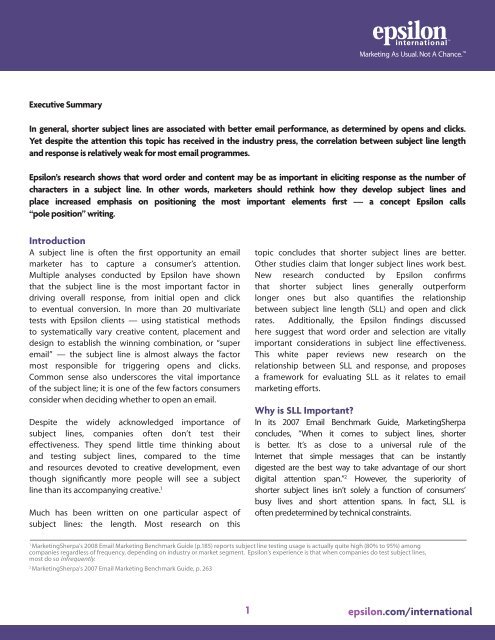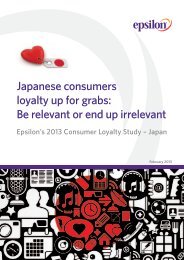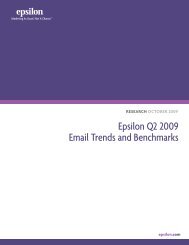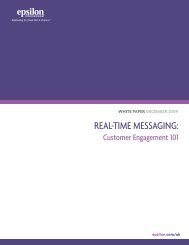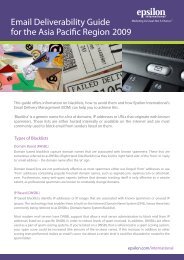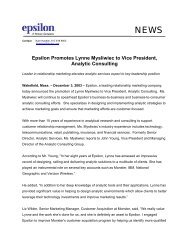Marketing As Usual. Not A Chance.Executive SummaryIn general, shorter subject lines are associated with better email performance, as determined by opens and clicks.Yet despite <strong>the</strong> attention this topic has received in <strong>the</strong> industry press, <strong>the</strong> correlation <strong>between</strong> subject line lengthand response is relatively weak for most email programmes.<strong>Epsilon</strong>’s research shows that word order and content may be as important in eliciting response as <strong>the</strong> number ofcharacters in a subject line. In o<strong>the</strong>r words, marketers should rethink how <strong>the</strong>y develop subject lines andplace increased emphasis on positioning <strong>the</strong> most important elements first — a concept <strong>Epsilon</strong> calls“pole position” writing.IntroductionA subject line is often <strong>the</strong> first opportunity an emailmarketer has to capture a consumer’s attention.Multiple analyses conducted by <strong>Epsilon</strong> have shownthat <strong>the</strong> subject line is <strong>the</strong> most important factor indriving overall response, from initial open and clickto eventual conversion. In more than 20 multivariatetests with <strong>Epsilon</strong> clients — using statistical methodsto systematically vary creative content, placement anddesign to establish <strong>the</strong> winning combination, or “superemail” — <strong>the</strong> subject line is almost always <strong>the</strong> factormost responsible for triggering opens and clicks.Common sense also underscores <strong>the</strong> vital importanceof <strong>the</strong> subject line; it is one of <strong>the</strong> few factors consumersconsider when deciding whe<strong>the</strong>r to open an email.Despite <strong>the</strong> widely acknowledged importance ofsubject lines, companies often don’t test <strong>the</strong>ireffectiveness. They spend little time thinking aboutand testing subject lines, compared to <strong>the</strong> timeand resources devoted to creative development, eventhough significantly more people will see a subjectline than its accompanying creative. 1Much has been written on one particular aspect ofsubject lines: <strong>the</strong> length. Most research on thistopic concludes that shorter subject lines are better.O<strong>the</strong>r studies claim that longer subject lines work best.New research conducted by <strong>Epsilon</strong> confirmsthat shorter subject lines generally outperformlonger ones but also quantifies <strong>the</strong> relationship<strong>between</strong> subject line length (SLL) and open and clickrates. Additionally, <strong>the</strong> <strong>Epsilon</strong> findings discussedhere suggest that word order and selection are vitallyimportant considerations in subject line effectiveness.This white paper reviews new research on <strong>the</strong>relationship <strong>between</strong> SLL and response, and proposesa framework for evaluating SLL as it relates to emailmarketing efforts.Why is SLL Important?In its 2007 Email Benchmark Guide, MarketingSherpaconcludes, “When it comes to subject lines, shorteris better. It’s as close to a universal rule of <strong>the</strong>Internet that simple messages that can be instantlydigested are <strong>the</strong> best way to take advantage of our shortdigital attention span.” 2 However, <strong>the</strong> superiority ofshorter subject lines isn’t solely a function of consumers’busy lives and short attention spans. In fact, SLL isoften predetermined by technical constraints.1MarketingSherpa’s 2008 Email Marketing Benchmark Guide (p.185) reports subject line testing usage is actually quite high (80% to 95%) amongcompanies regardless of frequency, depending on industry or market segment. <strong>Epsilon</strong>’s experience is that when companies do test subject lines,most do so infrequently.2MarketingSherpa’s 2007 Email Marketing Benchmark Guide, p. 2631epsilon.com/international
Email domains often limit <strong>the</strong> number of subject linecharacters displayed by default in <strong>the</strong> inbox. AOL,which is responsible for approximately 22% of <strong>the</strong>U.S. email market, limits subject lines to roughly 38characters. Yahoo!, with 21% of U.S. email, has aapproximate limit of 47 characters per subject line.Hotmail, which has 14% of <strong>the</strong> U.S. email market,uses word wrap to display subject lines on multiplelines, allowing approximately 45 characters per line. 3Therefore, 57% of U.S. email recipients see only<strong>the</strong> first 38 to 47 characters of a subject line whenmaking <strong>the</strong> decision to open an email. Additionally,<strong>the</strong> growing reliance on mobile devices — and <strong>the</strong>irsmaller screens that display even fewer characters —affects this trend as well.Primary ResearchMuch of <strong>the</strong> research on SLL and email performanceconcludes that shorter subject lines workbetter. 4 However, <strong>the</strong>se studies may over-simplify <strong>the</strong>impact by establishing artificial ranges for SLL and<strong>the</strong>n averaging performance for <strong>the</strong>se ranges. Thishas <strong>the</strong> effect of masking <strong>the</strong> overall strength of <strong>the</strong>relationship <strong>between</strong> SLL and email response.<strong>Epsilon</strong>’s analysis of SLL and response evaluates <strong>the</strong>correlation <strong>between</strong> <strong>the</strong> length of <strong>the</strong> subject line ofeach campaign and <strong>the</strong> unique open and total clickrates of that campaign. 5 This approach not onlydetermines whe<strong>the</strong>r shorter subject lines correlate withbetter email performance, it also analyzes <strong>the</strong> overallstrength of <strong>the</strong> relationship.MethodologyFive <strong>Epsilon</strong> clients were chosen at random from<strong>Epsilon</strong>’s retail client base. The analysis includesall messages from <strong>the</strong>se clients <strong>between</strong> June 2007and June 2008, with <strong>the</strong> exception of messages sentto fewer than 100 individuals and messages with apersonalised subject line. 6This analysis comprised 568.7 million emails from2,365 campaigns. Opens were calculated as uniqueopens/(multipart emails delivered + HTML emailsdelivered). Clicks were calculated as total clicks/totalemails delivered.Table 1: Correlation <strong>between</strong> SLL and response for retail companiesClient Avg. Open Avg. Click Avg. SLL Open/ Click/SLL Corr. SLL Corr.Retail Client 1 33.9% 7.3% 39.1 0.06 -0.21Retail Client 2 37.1% 9.8% 44.2 -0.02 0.09Retail Client 3 28.6% 8.1% 37.8 -0.15 -0.28Retail Client 4 42.1% 21.5% 29.7 -0.31 -0.09Retail Client 5 19.2% 6.5% 30.8 -0.08 -0.19Average 36.3 -0.10 -0.1 3Ano<strong>the</strong>r industry was selected to validate <strong>the</strong> findings<strong>between</strong> subject line and response. Thus, <strong>the</strong> samemethodology was applied to five random clients in<strong>the</strong> consumer services industry, which resulted in 17,516campaigns and more than 507.3 million messages.Table 2: Correlation <strong>between</strong> SLL and response for consumer services companiesClient Avg. Open Avg. Click Avg. SLL Open/ Click/SLL Corr. SLL Corr.Consumer Services Client 1 14.0% 3.8% 37.8 -0.42 -0.59Consumer Services Client 2 21.5% 2.0% 47.8 0.04 -0.04Consumer Services Client 3 33.0% 12.6% 36.4 -0.15 -0.03Consumer Services Client 4 33.8% 12.0% 36.2 -0.15 0.04Consumer Services Client 5 15.6% 3.3% 48.0 -0.46 -0.23Average 41.2 -0.23 -0.1 7Tables 1 and 2 clearly show that, overall, longer subjectlines correlate with lower open rates and click rates for bothindustries, yet <strong>the</strong> rates vary by company. For example, <strong>the</strong>open rates of Consumer Services Clients 1 and 5 show a highnegative correlation with SLL.3Internal <strong>Epsilon</strong> research. Actual character lengths depend on interface configuration. These approximations are based on <strong>the</strong> default layout for <strong>the</strong>sethree domains.4For example, see MailChimp’s “Best Practices in Writing Email <strong>Subject</strong> <strong>Line</strong>s” at http://www.mailchimp.com/resources/best-practicesin-writing-email-subject-lines.phtml,and MailerMailer’s November 2008 “Email Marketing Metrics Report” at http://imagehosting.mailermailer.com/email-marketing-metrics-2007h2.pdf.5Correlation measures <strong>the</strong> strength and direction of <strong>the</strong> linear relationship <strong>between</strong> two variables. It is measured <strong>between</strong> -1 and +1, where a-1 correlation is a perfect negative relationship (as one variable increases <strong>the</strong> o<strong>the</strong>r decreases at <strong>the</strong> same rate) and +1 is a perfect positive relationship.A 0 correlation means that no linear relationship exists <strong>between</strong> <strong>the</strong> variables. .6Campaigns with personalized subject lines were removed from <strong>the</strong> analysis because <strong>the</strong> personalization aspect would render <strong>the</strong> subject line ofvariable length.2


